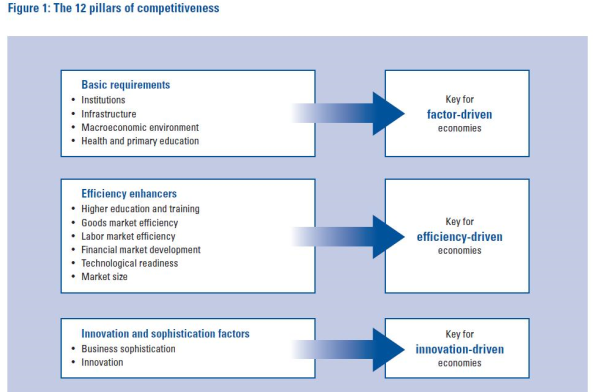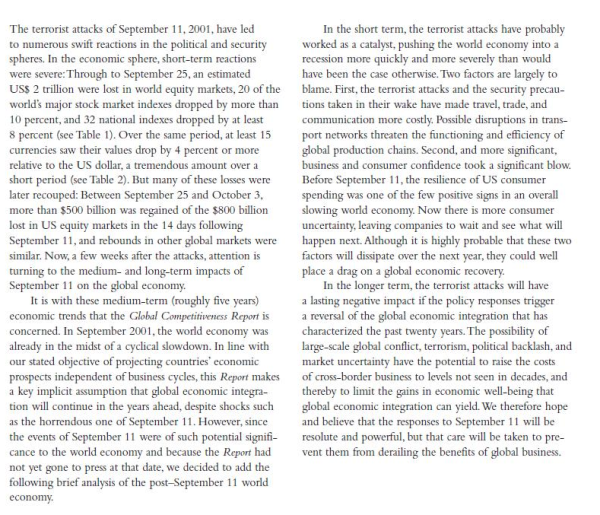The West abandons competitiveness
Recently an economist asked whether American productivity was actually in decline as reported, because there was some suggestion that measurement criteria may be faulty. In theory, since US competitiveness has “improved,” productivity should also have improved. But this takes us into the woolly world of globalist economics.
The World Economic Forum defines competitiveness as follows:
…the set of institutions, policies, and factors that determine the level of productivity of a country.
The World Competitiveness Report is actually a very interesting, intensive document and I would appreciate philosopher kings reading it. Apart from our paradoxical world where economic modelling of productivity contradicts with competitive measures, it appears that quality itself is also deteriorating. Measurements simply do not tally up anymore because of a lack of Quality Assurance and Control.
For example, take how Donald Trump polls before Iowa differed from the actual vote outcome. In addition Trump’s non-PC approach seems to contradict the generally accepted norms of the GOP; in fact, it exposed the lies of the some incumbents currently supporting the same party. Clearly there is a total lack of quality control in how polling and political parties work.
his has even gone so far that people accept “fact-checking†as the “norm.†In other words, independent fact checking has now been accepted as the “new†quality norm obviating the need for politicians to apply their own quality policies. This sad state of affairs can be seen in companies too –- despite companies having registered their ISO standards –- it has become a marketing tool only.
Another aspect of competitiveness can be seen in the changing assessment of Syrian competitiveness. According to the Global Competitiveness Index (GCI) of 2007 and 2011, Syria fell from its position at 80 (out of approximately 150 countries participating, with lower scores being more competitive) to 98. This is clearly a serious drop requiring further evaluation.
The GCI process measures and allocates all participating countries into three competitive groups as follows:
All together there are 12 pillars distributed between these three groups which allows the “judges†to fairly accurately allocate a country; for example, Syria was allocated to the “Basic Requirements†group because of its good merits in the first four pillars and bad merits in the other eight pillars. Obviously it is not a problem but in fact is intended to provide assistance (free of charge) to politicians in Syria to bite the bullet as it were.
In the 2016 report Syria appeared to have disappeared, most likely caused by their inability to even participate. This is where things become interesting. Clearly the World would benefit by encouraging Syria to improve (as it were), so why drop them from the GCI Report?
Before I answer that, let’s take a detour to what the GCI Report thought about 9/11.
From the above, three interesting paragraphs emerge:
- “This Report makes a key implicit assumption that economic integration will continue in the years aheadâ€
- “In the longer term, the terrorist attacks will have a lasting negative impact if the policy responses trigger a reversal of the global economic integration that has characterized the past twenty yearsâ€
- “market uncertainty have the potential to raise costs of cross-border business to levels not seen in decadesâ€
Despite enormous losses suffered from the 9/11 terror attacks, globalists really want to have an integrated economic system in the world with no borders because it will reduce their costs. Even a two trillion dollar loss is unimportant to achieve this goal. This is why Bush never killed Osama –- (it is unimportant) and Obama killed him (because it’s unimportant).
This is only one aspect we learn from Syria and Competitiveness. Syria fell off the report because cross-border trade to/from Syria is not an issue anymore.
Another aspect from the GCI report assesses the migrant world. Migrants appear to like moving to Germany and France as a lot of people have noticed. In other words, people from number 98 are moving to live with people at number six or 18. If one considers that Syria only performs well in four out of 12 pillars, imagine the re-education Germany will have to implement in order to educate Syrian adults and children on the additional eight pillars.
The last jewel the GCI report provides in this short evaluation relates to debt. Based on the latest trend to incur debt by simply flooding the marketplace (banks) with money (this is undoubtedly good for Globalists), it points out quite emphatically the following:
The accrual of public debt can enhance competitiveness if it is used to finance investments that raise productivity, such as upgrading schools or supporting research. However, if debt is used to finance present consumption, it burdens the economy in the long run with little tangible benefit.
General feedback regarding quantitative easing is that banks did not lend it to borrowers. They apparently used it via stock exchanges across the world to make money.
If one takes how much was spent to “fix Iraq†or Afghanistan, then one can imagine what it will cost to fix Syria. However, since that investment did not come from Syrians themselves, but from “across†the “cheap†border, the productivity of Syria will not improve, and neither will the economy of America because it is all a bubble.
Clearly globalists do not want quality measures because those increase costs (e.g. Iraqi buildings were never even finished), they do not want borders because those increase costs, but they do want countries with taxpayers to socialize those costs because that will be very productive for the globalists.
The contradiction is that having quality processes and borders is actually good for the middle-class. We have to instruct our elected representatives to represent their electorate (or get prosecuted) and not their donors, simply because it improves competitiveness (the correct way). This is important because bad economy correlates with increased mortality (Syria and Zimbabwe).
One simple improvement may be proposed here (for evaluation): Implement a system manager in each country to perform the necessary loss-benefit analysis of any national policy for its own tax-payers and then implement an enforced quality assurance process that will follow that investment through to its predicted outcome.
This is what Trump intends doing IMO: like a good manager, to run America with its own quality-assured, competitive system. No more “competitive or productive measurements from foreigners†will be necessary after that. They can keep all of that for themselves (especially the incorrect measurement parts).
Tags: donald trump, economics, global competitiveness index, immigration, migration












